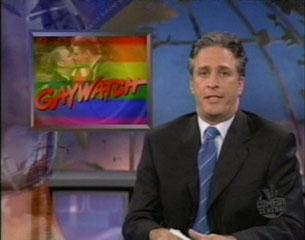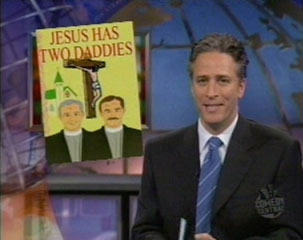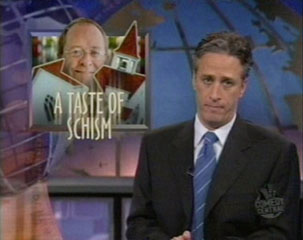Whew! What a relief. My favorite scenario has actually come to pass.
People voted. Votes were counted. Obama won. I look like chicken little a little. The end.
Well not quite the end, in the sense that, in my state, Proposition 8 banning same-sex marriages passed, which I think is quite unfortunate, and makes the progressive Obama victory just a little bittersweet...
It also made me change my "gay rights" category to "equal rights "civil rights" because this isn't about the right to be gay, it's about the right to marry whomever you wish. It's a pretty big part of that whole "pursuit of happiness" thing, if you ask me.
Update: 11/07/08 - (And yes, I just changed again. I remembered what happened with the whole ERA thing in the 80s, and how saying "equal rights" instead of "civil rights" seems to water the concept down somehow. Being able to marry whomever you wish is a CIVIL RIGHT. Ok, now I can move on...)
But alas! Time to move forward and keep up this momentum we seem to have going.
Thanks for all your information, love and support, during these past 8 years of hell.
There were some times in there when all we knew we had was each other - over the internet.
Now we are making our presence felt in the "real" world too. Good job!
Onward!
This just in from my pal Bobby Lilly.
Bobby's trying to get the word out about the Million for Marriage.org website and petition in favor of same sex marriages.
It's all from the Human Rights Campaign.
From Bobby: Got this request and am passing it on to friends I think might support the issue. So, if you haven't signed the petition yet, please use the link they offer in the body of the message below and maybe pass it on to a friend.
Click the following link to sign a petition that will be delivered to Congress in favor of same sex marriage:
http://www.hrcactioncenter.org/ct/3daiyNY1FBPx/
****************************
Human Rights Campaign/MillionForMarriage.org
Let's get to a half-million by May 17
http://www.hrcactioncenter.org/ct/37aiyNY1FBP3/****************************
Dear Bobby,
In just 10 days, same-sex couples will be issued marriage licenses for the first time in Massachusetts. As the newlyweds celebrate their marriages, we know that our ultra-conservative opponents will use this historic moment to viciously attack them and all GLBT families.
We - all of us who support marriage equality - must demonstrate our strength and unity at this critical time. Here's one important way you can help: Right now, almost 450,000 people have signed the Million for Marriage petition. By May 17th, we'd like to get to 500,000 - a half-million people.
Please, take a minute to think of one more person that you could persuade to stand up for equality. Click here to send them a message right now:
http://www.hrcactioncenter.org/ct/37aiyNY1FBP3/Or forward this e-mail to your friends and ask them to click the following link to sign the petition:
http://www.hrcactioncenter.org/ct/3daiyNY1FBPx/Our voices - 500,000 loud and strong -- will help counter the right-wing extremists' wave of fear and lies, and will give hope and support to the couples about to marry in Massachusetts. Thank you, as always, for your actions today.
Many thanks,
Cheryl A. Jacques President
**************************** (c)2004, Human Rights Campaign, 1640 Rhode Island Ave., N.W., Washington, D.C. 20036-3278 Phone: 202/628-4160 TTY: 202/216-1572 Fax: 202/347-5323, membership@hrc.org
This is from the March 4, 2004 program.
Here's Jon commenting on the Mayor of New Paltz' illegal marriage solemnization:
Stewart Comments On All The Gay Marriages (Small - 4 MB)
The Daily Show (The best news on television.)
Disclaimer: this first couple didn't actually get married, but the rest did.
A nice collection of happy gay marriage photos.
SJC: Gay Marriage Legal in Mass.
By Kathleen Burge for The Boston Globe.
The Supreme Judicial Court today became the nation's first state supreme court to rule that same-sex couples have the legal right to marry."We declare that barring an individual from the protections, benefits and obligations of civil marriage solely because that person would marry a person of the same sex violates the Massachusetts constitution," Chief Justice Margaret Marshall wrote in the 4-3 decision.
The ruling won't take effect for 180 days in order to allow the Legislature "to take such action as it may deem appropriate in light of this opinion," the court ruled in its 50-page decision. Since the SJC is the ultimate authority on the state constitution, however, the Legislature cannot overturn today's decision -- nor would the US Supreme Court agree to interpret a state's constitution.
Opponents could fight for a constitutional amendment, but the soonest that could be placed on the ballot is 2006. The Legislature has already been considering several bills, including one that would allow gay marriage, that would grant benefits to same-sex couples.
The SJC ruling held that the Massachusetts constitution "forbids the creation of second-class citizens." The state Attorney General's office, which argued to the court that state law doesn't allow gay couples to marry, "has failed to identify any constitutionally adequate reason for denying civil marraige to same-sex couples," Marshall wrote.
The court rejected the claim of a lower court judge that the primary purpose of marriage was procreation.
Here is the full text of the article in case the link goes bad:
http://www.boston.com/news/local/massachusetts/articles/2003/11/18/sjc_gay_marriage_legal_in_mass/
SJC: Gay Marriage Legal in Mass.
By Kathleen Burge
The Boston Globe
Tuesday 18 November 2003
The Supreme Judicial Court today became the nation's first state supreme court to rule that same-sex couples have the legal right to marry.
"We declare that barring an individual from the protections, benefits and obligations of civil marriage solely because that person would marry a person of the same sex violates the Massachusetts constitution," Chief Justice Margaret Marshall wrote in the 4-3 decision.
The ruling won't take effect for 180 days in order to allow the Legislature "to take such action as it may deem appropriate in light of this opinion," the court ruled in its 50-page decision. Since the SJC is the ultimate authority on the state constitution, however, the Legislature cannot overturn today's decision -- nor would the US Supreme Court agree to interpret a state's constitution.
Opponents could fight for a constitutional amendment, but the soonest that could be placed on the ballot is 2006. The Legislature has already been considering several bills, including one that would allow gay marriage, that would grant benefits to same-sex couples.
The SJC ruling held that the Massachusetts constitution "forbids the creation of second-class citizens." The state Attorney General's office, which argued to the court that state law doesn't allow gay couples to marry, "has failed to identify any constitutionally adequate reason for denying civil marraige to same-sex couples," Marshall wrote.
The court rejected the claim of a lower court judge that the primary purpose of marriage was procreation.
Marshall was joined in the majority opinion by Justices John Greaney, Roderick Ireland, and Judith Cowin. Justices Francis Spina, Martha Sosman, and Robert Cordy opposed the decision.
In the dissent, Cordy wrote that the state's marriage statute historically described the union of one man and one woman. The law did not violate the Massachusetts constitution because "the Legislature could rationally conclude that it furthers the legitimate state purpose of ensuring, promoting and supporting an optimal social structure for the bearing and raising of children," Cordy wrote.
The SJC case began in 2001 after seven same-sex couples from Boston to Northampton to Orleans went to their local city or town offices and applied for marriage licenses. When their requests were rejected, they filed a lawsuit in Suffolk Superior Court.
The couples sued the state Department of Public Health, which administers marriage laws and requires blood tests. In May 2002, Suffolk Superior Court Judge Thomas E. Connolly threw out the case before it went to trial.
Connolly ruled that the state constitution does not give same-sex couples the right to marry. Children have long been considered central to marriage, he wrote, and same-sex couples cannot bear children. The seven couples appealed to the SJC, and the justices agreed to hear the case.
The court battle drew national attention as the latest battleground for gay marriage. Hundreds of groups from Dorchester to Australia weighed in on the case, filing more than two dozen friend-of-the-court briefs.
State attorney generals in Utah, Nebraska, and South Dakota opposed the seven couples. So did religious groups from Catholics to fundamental Protestants to Orthodox Jews. Dozens of groups, including state and local bar associations, also supported the seven couples.
Since the SJC heard the case in early March, there have been significant legal developments in gay rights. In June, Canada voted to allow same-sex marraige after the Ontario Court of Appeals declared prohibitions against homosexual marriage unconstitutional.
"The restriction against same-sex marriage is an offense to the dignity of lesbians and gays, because it limits the range of relationship options open," the Canadian court wrote.
At the end of June, the US Supreme Court struck down a Texas anti-sodomy law in a 6-3 decision, ruling that gays have the constitutional right to make fundamental choices about "intimate conduct."
The Supreme Court decision was sweeping in its endorsement of gay rights. Justice Antonin Scalia, one of the dissenters, argued that the majority decision would likely pave the way for gay marriage.
Today's decision capped months of anticipation that recalled a similar drama in Vermont, the first state in the country to establish civil unions for gay couples. Three gay couples sued that state in the late 1990s after being denied the right to marry.
Five days before Christmas in 1999, the Vermont Supreme Court ruled that the Vermont constitution mandated equal treatment of heterosexual and homosexual couples. The court left it to the legislature to decide whether to allow gay marriage or to create a parallel institution for gay couples.
Then-Gov. Howard Dean immediately announced he would support the latter, declaring himself uncomfortable with explicit gay marriage. The debate split the state's normally liberal electorate in a bitter debate, but the legistlature acted quickly. Four months after the court ruled, Dean signed civil unions legislation in a private ceremony that did not defuse opponents' anger.
That fall, campaigning for re-election in a state famed for its small-town civility, the governor donned a bullet-proof vest. Dean, who had won four previous landslides, barely got 50 percent of the vote, the level needed under Vermont law to avoid a run-off in the legislature.
Effects from Vermont's law rippled around the country. Gay couples forbidden to codify their partnerships in any other state flocked to the Green Mountains for civil unions. The debate has prompted some American newspapers to include civil union announcements in their wedding pages. And Dean touts his signing the law as part of his presidential campaign platform.
This is from the September 11, 2003 program.
Daily Show Gaywatch Update (Small - 9 MB)

The Daily Show (The best news on television.)
This is from CBS News on September 8, 2003.
Gay High School Opens In NYC (Small - 3 MB)
Hope I got the dates right on these guys. I'm pretty much in "catch up like a madwoman" mode...It's from August 6, 2003 -- I think :-)
A pair of comedy clips to assist in furthering the aggressive homosexual agenda, courtesy of The Daily Show. (The best news on television.)
GayWatch (Small - 10 MB)
Stephen Colbert On The Recent Gaysplosion! (Small - 9 MB)
This is from the July 31, 2003 program.
Jon Stewart On Gay Marriage (Small - 2 MB)
The Daily Show (The best news on television.)
Supreme Court Strikes Down Texas Law Banning Sodomy
By The Associated Press for the NY Times.
The 6-3 ruling reverses course from a ruling 17 years ago that states could punish homosexuals for what such laws historically called deviant sex.Laws forbidding homosexual sex, once universal, now are rare. Those on the books are rarely enforced but underpin other kinds of discrimination, lawyers for two Texas men had argued to the court.
AdvertisementThe men ``are entitled to respect for their private lives,'' Justice Anthony M. Kennedy wrote.
``The state cannot demean their existence or control their destiny by making their private sexual conduct a crime,'' he said.
Justices John Paul Stevens, David Souter, Ruth Bader Ginsburg and Stephen Breyer agreed with Kennedy in full. Justice Sandra Day O'Connor agreed with the outcome of the case but not all of Kennedy's rationale.
Chief Justice William H. Rehnquist and Justices Antonin Scalia and Clarence Thomas dissented.
Here is the full text of the article in case the link goes bad:
http://www.nytimes.com/aponline/politics/AP-Scotus-Sodomy.html
Supreme Court Strikes Down Texas Law Banning Sodomy
By THE ASSOCIATED PRESS
Filed at 4:05 p.m. ET
WASHINGTON (AP) -- The Supreme Court struck down a ban on gay sex Thursday, ruling that the law was an unconstitutional violation of privacy.
The 6-3 ruling reverses course from a ruling 17 years ago that states could punish homosexuals for what such laws historically called deviant sex.
Laws forbidding homosexual sex, once universal, now are rare. Those on the books are rarely enforced but underpin other kinds of discrimination, lawyers for two Texas men had argued to the court.
Advertisement
The men ``are entitled to respect for their private lives,'' Justice Anthony M. Kennedy wrote.
``The state cannot demean their existence or control their destiny by making their private sexual conduct a crime,'' he said.
Justices John Paul Stevens, David Souter, Ruth Bader Ginsburg and Stephen Breyer agreed with Kennedy in full. Justice Sandra Day O'Connor agreed with the outcome of the case but not all of Kennedy's rationale.
Chief Justice William H. Rehnquist and Justices Antonin Scalia and Clarence Thomas dissented.
The court ``has largely signed on to the so-called homosexual agenda,'' Scalia wrote for the three. He took the unusual step of reading his dissent from the bench.
``The court has taken sides in the culture war,'' Scalia said, adding that he has ``nothing against homosexuals.''
Although the majority opinion said the case did not ``involve whether the government must give formal recognition to any relationship that homosexual persons seek to enter,'' Scalia said the ruling invites laws allowing gay marriage.
``This reasoning leaves on shaky, pretty shaky grounds, state laws limiting marriage to opposite-sex couples,'' Scalia wrote.
Thomas wrote separately to say that while he considers the Texas law at issue ``uncommonly silly,'' he cannot agree to strike it down because he finds no general right to privacy in the Constitution.
Thomas calls himself a strict adherent to the actual words of the Constitution as opposed to modern-day interpretations. If he were a Texas legislator and not a judge, Thomas said, he would vote to repeal the law.
``Punishing someone for expressing his sexual preference through noncommercial consensual conduct with another adult does not appear to be a worthy way to expend valuable law enforcement resources,'' Thomas wrote.
The two men at the heart of the case, John Geddes Lawrence and Tyron Garner were each fined $200 and spent a night in jail for the misdemeanor sex charge in 1998.
The case began when a neighbor with a grudge faked a distress call to police, telling them that a man was ``going crazy'' in Lawrence's apartment. Police went to the apartment, pushed open the door and found the two men having anal sex.
``This ruling lets us get on with our lives and it opens the door for gay people all over the country,'' Lawrence said Thursday.
Ruth Harlow, one of Lawrence's lawyers, called the ruling historic.
``The court had the courage to reverse one of its gravest mistakes and to replace that with a resounding statement,'' of gay civil rights, Harlow said.
``This is a giant leap forward to a day where we are no longer branded as criminals.''
As recently as 1960, every state had an anti-sodomy law. In 37 states, the statutes have been repealed by lawmakers or blocked by state courts.
Of the 13 states with sodomy laws, four -- Texas, Kansas, Oklahoma and Missouri -- prohibit oral and anal sex between same-sex couples. The other nine ban consensual sodomy for everyone: Alabama, Florida, Idaho, Louisiana, Mississippi, North Carolina, South Carolina, Utah and Virginia.
Thursday's ruling apparently invalidates those laws as well.
The Supreme Court was widely criticized 17 years ago when it upheld an antisodomy law similar to Texas'. The ruling became a rallying point for gay activists.
Of the nine justices who ruled on the 1986 case, only three remain on the court. Rehnquist was in the majority in that case -- Bowers v. Hardwick -- as was O'Connor. Stevens dissented.
``Bowers was not correct when it was decided, and it is not correct today,'' Kennedy wrote for the majority Thursday.
Kennedy noted that the current case does not involve minors or anyone who might be unable or reluctant to refuse a homosexual advance.
``The case does involve two adults who, with full and mutual consent from each other, engaged in sexual practices common to a homosexual lifestyle. Their right to liberty under (the Constitution) gives them the full right to engage in their conduct without intervention of the government.''
A long list of legal and medical groups joined gay rights and human rights supporters in backing the Texas men. Many friend-of-the-court briefs argued that times have changed since 1986, and that the court should catch up.
At the time of the court's earlier ruling, 24 states criminalized such behavior. States that have since repealed the laws include Georgia, where the 1986 case arose.
Texas defended its sodomy law as in keeping with the state's interest in protecting marriage and child-rearing. Homosexual sodomy, the state argued in legal papers, ``has nothing to do with marriage or conception or parenthood and it is not on a par with these sacred choices.''
The state had urged the court to draw a constitutional line ``at the threshold of the marital bedroom.''
Although Texas itself did not make the argument, some of the state's supporters told the justices in friend-of-the-court filings that invalidating sodomy laws could take the court down the path of allowing same-sex marriage.
The case is Lawrence v. Texas, 02-102.
Yippie Kai-yay! Consenting adults are allowed to have sex however they want in the privacy of their own homes!
It almost seems like we're living in a democracy in the 21st Century!
And Howard Dean steps up to the plate to make a statement on the subject:
Statement on Supreme Court's Decision on Lawrence vs. Texas
WASHINGTON, DC – “I applaud the Supreme Court ruling in the case of Lawrence v. Texas overturning the Texas anti-sodomy law. This decision marks a significant advance toward achieving equal rights for all Americans. For too long, laws like this have divided us by race, by gender and by sexual orientation. As a Governor who worked hard to protect the rights of gay and lesbian couples, I am extremely pleased with the Supreme Court's ruling."Every American, regardless of sexual orientation, should be afforded the right to privacy. The Texas anti-sodomy law was nothing less than government-sanctioned intolerance and discrimination. The fact that President Bush defended the law while he was Governor shows that he is not the uniter he claims to be.”


